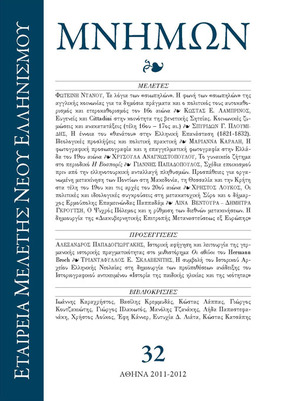Εθνική ομολογία και συμβολική στην Ελλάδα του 19ου αιώνα : οι εθνομάρτυρες
Part of : Μνήμων ; Vol.24, 2002, pages 107-143
Issue:
Pages:
107-143
Parallel Title:
National Confession and Symbolic Usage in Nineteenth-Century Greece : the Martyrs for the Nation (Ethnomartyres)
Section Title:
Articles
Abstract:
The article deals with the concept of martyrdom in nineteenth-century Greece. Within the context of Ottoman social realities, before the foundation of the Greek nation-state, martyrdom used to signify dying for the Christian faith. The actual martyrs were usually converts to Islam who repented, publicly declared their return to Christianity, and who subsequently suffered the death penalty as apostates. During the Greek war of independence (1821-1829), however, the concept of martyrdom underwent a major transformation brought about by the needs and realities of armed struggle. New martyrs emerged, martyrs for freedom, who did not die a death pro Christi but pro patria. Although the religious connotations of martyrdom did not vanish, this conceptual shift constitutes a paradigmatic change towards modernity. The article focuses on the genesis of this new paradigm of martyrdom in the Greek nation-state and its elaboration during the nineteenth century. Subsequently it proceeds to a brief analysis of the legends that emerged around four historical figures: Athanasios Diakos, whose death constitutes a link between the old paradigm of the martyr for the faith and the new one of the martyr for the nation, Rigas Velestinlis, the so-called «first martyr» (protomartys), Gregorios V, Patriarch of Constantinople, the «national martyr» (ethnomartys), and Kosmas the Aetolian, the «martyr and apostle of the nation» ; (ethnomartys kai ethnapostolos). Emphasis is put not only on the coining of new terms and the subsequent shifts in meaning, but also on the metaphorical use of martyrdom in nineteenth-century Greek historiography. In this process, elements originating in a religious conceptual context became embedded in the emerging secular national discourse and acquired a new meaning.
Subject:
Subject (LC):




